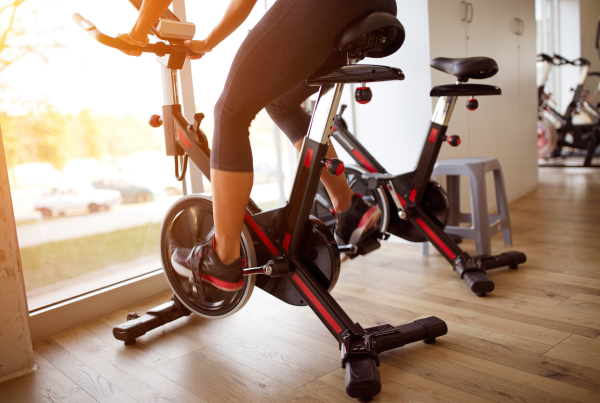Francesca Sills highlights how it feels to work as a fitness professional going through perimenopause.
Many of us become fitness professionals because we love to be active. We love sports, exercising, cheering others on, the feeling after a good session and helping others achieve their goals. Our work allows us to educate, inspire and support others in their health and fitness journeys. But what about when we are the ones who need inspiration and support?
For women in the fitness industry, going through perimenopause can be an all-consuming nightmare. Symptoms like brain fog, fatigue, reduced confidence and changes in body composition can easily get overwhelming and disheartening. Imagine you are up at the front of a class, instructing a large group, and forget what the next set is? Or you can’t remember the name of the next asana? Maybe you need to make changes to your client schedule and end up double booking or you aren’t at the right place at the right time. It’s not easy.
Now, in no way am I saying that these concerns are just isolated to this industry. We know that menopause can post a huge issue across all industries. The 40s is often a time when women are at a peak in their career. They are skilled, confident, have experience and influence on those around them. They hold positions of seniority and need to make important decisions. They are a huge asset to any division. But it is also a time when their bodies and minds can feel all over the place(!) and they are often trying to be a full-time parent to an angsty teen and may even be caring for older family members as well.
Let’s take a look at some of the facts:
- In the UK, nearly eight out of 10 menopausal women are employed, making them the fastest-growing demographic in the workforce.1
- Menopause symptoms significantly impact performance, career decisions, work satisfaction and attendance.
- Fatigue, difficulty sleeping, poor concentration and poor memory are the symptoms that impact employees the most at work.
- Over one third of women indicate that menopausal symptoms have influenced their career decisions, including considerations of leaving their jobs or reducing hours.2
- Globally, menopausal symptoms are estimated to cost $150 billion in lost productivity.3
- Manager awareness about menopause and flexible working schedules are key to positively influencing these factors.
This obviously doesn’t sound great. While these things are becoming more known and people are talking about this more, we still have a way to go; so, in the meantime, it is important that we know how to help ourselves through this difficult time, maybe even leveraging off this and finding new opportunities!
Circling back to the saga of being a woman in the fitness industry; many of us take pride in looking after our body well. We are in tune with its changes and we are able to adapt our lifestyle and routine when necessary. Perimenopause and fluctuating hormones bring a lot of changes that are outside of our control and can go against what we feel like we work hard to achieve.
Outside of physicality, it can also show up in the workplace in a number of unwanted ways. Check out the following:
Brain fog and loss of confidence
I repeat, imagine teaching a class and you forget your next set or asana? Or you’re double-booking clients left, right and centre.
If you work in the group class space, you will know that to show up and stand, commanding a group of people, takes a certain amount of confidence and energy. If we aren’t feeling our best, this can be hard and impact the experience of the members. Memory lapse and self-consciousness might also make you doubt yourself and your abilities, feeling as though you aren’t so good at this anymore.
Fatigue
Working with people all day takes energy. Particularly if you need to act as the main motivator/hype person! Lower energy levels can make getting through class planning, delivery and one-to-ones seem impossibly draining and this can have a knock-on effect. Maybe we then reach for more caffeine or sugar, then we don’t sleep as well, then we feel even worse! It can become a seemingly never-ending cycle.
Exercise preferences
As the body and mind evolve, so do our likes and dislikes. Exercise that we once enjoyed or that once made us feel amazing may no longer hit home. Maybe you used to love getting into the weights room multiple times per week but now you would rather slide into a yoga class or clear your mind on a long-distance run/cycle.
While there is absolutely nothing wrong with this, some people find this a challenge to their identity within the industry and this can be hard to face. You may have been known for so many years as a top-notch strength and conditioning coach or personal trainer, and now you’re thinking you want to re-skill in something completely different. Thoughts like is this a mistake? What about all the hard work I have put in to build my name and network? What if no one comes to see me? What if people think I am bad at it? are not uncommon.
Hot flashes and other annoyances
Hot flashes are uncomfortable. Hot flashes while wearing Lycra and other tight clothing are even more uncomfortable! Hot flashes while wearing Lycra and teaching exercise = the worst!
Being uncomfortable often makes people agitated and can distract you from the task at hand. Depending on the frequency and severity of your hot flashes, you may constantly feel distracted or anxious, thinking when the next one is going to come on. Are people going to notice? Should I say anything? How can I find some air? Maybe I should have a shower? … the list goes on.
For others, it can be really off putting from exercise which, when a lot of your life revolves around this, is not a nice feeling!
Body image
For some in the industry, their work is tied to their physicality and aesthetic. Changes to the body that are unwanted or seen as negative can play largely on body image and self-identity. You may feel as though you are less valuable, that you are being judged more or you may start to pay extra attention to the younger and seemingly ‘fitter’ and more energetic people around you, making you feel worse about the situation and yearn for the person you ‘used to be’.
What to do?
So, what can we do about this? How can we embrace our changing physiology and continue to make it work for us? How can we continue to show up as the best version of ourselves and influence and inspire colleagues and clients?
Embrace flexibility
Making change can be daunting, particularly if you have been operating a certain way for so long and have clients and co-workers to think about! Nothing causes more of a headache than trying to re-schedule consistent long-term clients to a new schedule! However, if this means you are going to give them a better experience and feel happier in yourself, then this is needed. Think about changing your working hours, taking fewer group classes and more one-to-ones, swapping the classes you do take (body pump → mat Pilates) etc. This can help you better manage fatigue and energy levels. Some people might end up disappointed that they are losing their favourite trainer, but more people will be happier if you can give them your all.
Perimenopause can also be a good excuse to re-skill. Take the leap and do the teacher training you have been thinking about! Or, if you feel like it, move to a more behind-the-scenes, admin/managerial role where you might be able to work from home occasionally. Delve into the areas that are more relevant to the New You.
Make it your niche
No one knows the needs of a perimenopause client better than someone going through perimenopause. It makes you extremely relatable and understanding. This is your time to shine and educate and advocate for all things menopause! Turn the 40+ women into your target market and leverage off your experience.
You can also open the conversation in your workplace and others’ workplaces on what menopause is and how it impacts us. Menopause is a topic that, while gaining more traction, still isn’t spoken about that often and the more we can get people talking and listening to good-quality, proven research and information, the better.
Prioritise you
Perimenopause is a good time for out with the old and in with the new.
Let go of the routines and self-care that aren’t really doing it for you anymore and experiment with some new ones.
Sleep hygiene, balanced and well-informed nutrition and nervous system regulation are key. Maybe this comes in the form of hot baths, meditation, more yoga, investing time in working with a dietitian or getting yourself some ear plugs and an eye mask (a very sexy look might I add!), try whatever small things you need to do to keep you feeling yourself.
The better you feel within yourself, the better able you are to show up for others.
Make yourself comfortable
We spend a lot of our time at work, so we need to be comfortable and feel good. Working in the fitness industry, it’s likely you wear something pretty tight and, sometimes, pretty uncomfortable, particularly when it’s hot!
Invest in some breathable, moisture-wicking gear. Swap your tight singlets for a looser fit or a t-shirt so you feel less restricted, particularly if you are self-conscious about uncomfortable changes to your mid-section. Maybe get rid of the leggings and go for loose shorts or aerobic pants too.
If you’re teaching classes, try to position yourself in front of the fan/air conditioner or move them to where you are. Having a cool, damp towel nearby might be handy as well. I am also a big fan of the lunchtime shower. A quick freshen up before the afternoon shift can make a huge difference.
If you are an employer, try to be open about allowing people to have changes to uniform, so long as the colours are right and people are still looking smart. You never know what a difference it might make to someone.
Perimenopause is a time of transition and growth. While it brings challenges, it’s also an opportunity to redefine your career, embrace change and prioritise yourself. By adapting your work and lifestyle, you can continue to thrive and inspire those around you. Remember, you’re not alone in this journey and your experience can make you an even stronger advocate and role model in the fitness industry. It might not be easy, it might not happen overnight but, in the end, it keeps you doing what you love and feeling your best, and nothing can take that away from you.

Francesca Sills
Francesca Sills is a clinical exercise physiologist based in Brisbane, Australia. She has worked with a diverse caseload across a range of settings in both Australia and the UK. Francesca is particularly passionate about supporting women over 40 through the often turbulent transition of perimenopause and beyond, helping them navigate the physical and emotional challenges of this stage of life. Francesca blends her knowledge in strength and conditioning, yoga and Pilates to help empower women through exercise and movement unique to their needs, building strength and resilience and helping them regain a sense of self.
Read more about menopause in this FitPro blog Managing the menopause
References
- menopauseintheworkplace.co.uk/articles/menopause-and-work-its-important/
- ncbi.nlm.nih.gov/articles/PMC10540666/
- aarp.org/pri/topics/work-finances-retirement/employers-workforce/menopause-workplace/







